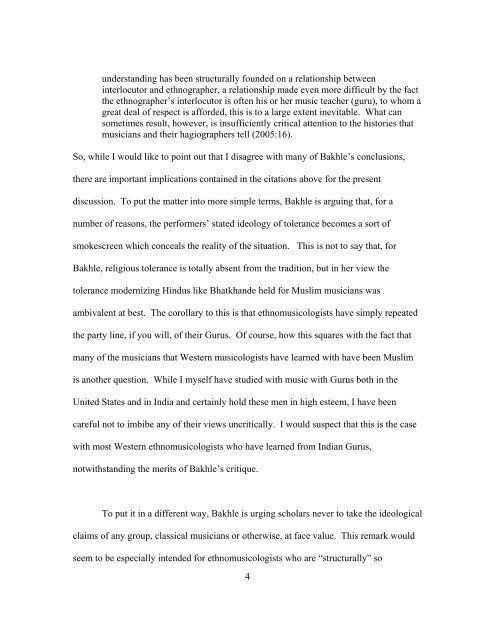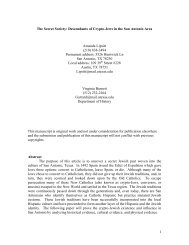- Page 1 and 2: Copyright by Jeffrey Michael Grimes
- Page 3 and 4: The Geography of Hindustani Music:
- Page 5 and 6: great musical knowledge, which both
- Page 7 and 8: The Geography of Hindustani Music:
- Page 9 and 10: Chapter: Table of Contents Introduc
- Page 11 and 12: Introduction Region as a Factor in
- Page 13: Bakhle’s work is not musicologica
- Page 17 and 18: assumption on which this study is b
- Page 19 and 20: as “basically non-linguistic phen
- Page 21 and 22: available in attempts to establish
- Page 23 and 24: Hubli, as well as Goa. There are a
- Page 25 and 26: ethnically Bengali or Marathi, but
- Page 27 and 28: egion after Independence. Perhaps t
- Page 29 and 30: music that leads to the discovery o
- Page 31 and 32: the question at hand.” I would ag
- Page 33 and 34: ethnomusicological or otherwise, de
- Page 35 and 36: important region for the cultivatio
- Page 37 and 38: in the context of region. Thus, it
- Page 39 and 40: In terms of who I interviewed, ther
- Page 41 and 42: observation as the starting point f
- Page 43 and 44: more critical studies which seek to
- Page 45 and 46: This is the “Outside View,” an
- Page 47 and 48: 1. Possible Objections to the Assoc
- Page 49 and 50: strictly musical criteria. Of these
- Page 51 and 52: tutelage of the raaj gaayak (chief
- Page 53 and 54: details of what they were teaching
- Page 55 and 56: Considering VDP’s nationalist cre
- Page 57 and 58: as his parents were music lovers, a
- Page 59 and 60: formulating a new body of theory wh
- Page 61 and 62: Lucknow (later re-named Bhatkhande
- Page 63 and 64: already mentioned, music colleges i
- Page 65 and 66:
a united front, if you will, to for
- Page 67 and 68:
one”(1980:155). I will discuss wh
- Page 69 and 70:
Indian life, particularly in contra
- Page 71 and 72:
hierarchical structure in which eac
- Page 73 and 74:
carved from the multi-linguistic Ma
- Page 75 and 76:
which the country might have faced
- Page 77 and 78:
should be created. This decision wa
- Page 79 and 80:
comes up short. All these phenomena
- Page 81 and 82:
language and region. Along with thi
- Page 83 and 84:
the Samyukta Mahrashtra Samithi (SM
- Page 85 and 86:
incompatible or contradictory). Jul
- Page 87 and 88:
difficult to assess at any rate), b
- Page 89 and 90:
these terms might be utilized in ev
- Page 91 and 92:
positive evidence in proving the im
- Page 93 and 94:
the most ubiquitous type of music i
- Page 95 and 96:
has become an established force on
- Page 97 and 98:
discussion primarily to performing
- Page 99 and 100:
every aspect of the performance, fr
- Page 101 and 102:
aspect of the tradition, but musici
- Page 103 and 104:
Another thing I liked about classic
- Page 105 and 106:
nothing regional about Hindustani m
- Page 107 and 108:
others who identify themselves as e
- Page 109 and 110:
ecause, as the early gharaanedaar m
- Page 111 and 112:
That performing musicians should en
- Page 113 and 114:
outside of Khyal. According to Neum
- Page 115 and 116:
types of musicians in caste terms a
- Page 117 and 118:
the importance of heredity as an in
- Page 119 and 120:
musicianship of the individual prac
- Page 121 and 122:
“Dhrupadiyas [Dhrupad singers] an
- Page 123 and 124:
gharana or of an individual singer
- Page 125 and 126:
cum performers who have managed to
- Page 127 and 128:
of India. The other factor of impor
- Page 129 and 130:
the access to good Gurus, I feel th
- Page 131 and 132:
secondarily in terms of tabla playe
- Page 133 and 134:
3. Khyal in Maharashtra Considering
- Page 135 and 136:
saarangiya started playing a partic
- Page 137 and 138:
Hindus has proven to have been fort
- Page 139 and 140:
institutions, to the extent that mu
- Page 141 and 142:
period of discipleship under Devjib
- Page 143 and 144:
Joshibua also was a regular user of
- Page 145 and 146:
Khyal gharana). Besides Yashwantbua
- Page 147 and 148:
gharaanedaar stalwarts themselves s
- Page 149 and 150:
music upon first hearing the great
- Page 151 and 152:
As Wade notes, Abdul Karim initiall
- Page 153 and 154:
Maharashtrian musical circles as
- Page 155 and 156:
for her part, was another singer fr
- Page 157 and 158:
well-known Kishori Amonkar was inco
- Page 159 and 160:
While he did well with Sanskrit, it
- Page 161 and 162:
darbaar. He heard Bhaskarbua sing a
- Page 163 and 164:
that was universally admired. It sh
- Page 165 and 166:
I would argue that there are two br
- Page 167 and 168:
to the Hindustani music establishme
- Page 169 and 170:
Systematic rhythmic variations are
- Page 171 and 172:
Maharashtrian contemporaries. It do
- Page 173 and 174:
closest thing there is to an all-In
- Page 175 and 176:
As Charles Capwell, in his article
- Page 177 and 178:
Of course, it is all the more telli
- Page 179 and 180:
of the Vishnupur gharana, two stand
- Page 181 and 182:
The season for these North Indian p
- Page 183 and 184:
The influence of Bade Ghulam is the
- Page 185 and 186:
Bengali singers have distorted what
- Page 187 and 188:
If we look back to some of the nota
- Page 189 and 190:
and longtime Calcutta resident Vija
- Page 191 and 192:
So, within this excerpt, we find tw
- Page 193 and 194:
analysis of audio recordings of pas
- Page 195 and 196:
Calcutta, has the SRA helped to de-
- Page 197 and 198:
Before concluding this section on K
- Page 199 and 200:
others to the list, including Niyam
- Page 201 and 202:
Khan, who had migrated with Wajid A
- Page 203 and 204:
Maharashtra, this specific phenomen
- Page 205 and 206:
esponsible for the melodic aspects
- Page 207 and 208:
potentially accompany singers from
- Page 209 and 210:
notably Dhrupad singing) have survi
- Page 211 and 212:
styles of accompaniment, straight T
- Page 213 and 214:
the case - other tabla players have
- Page 215 and 216:
outside of their allotted solos as
- Page 217 and 218:
agas. There is an important distinc
- Page 219 and 220:
positively, so to speak, in order t
- Page 221 and 222:
instrument, but also play their own
- Page 223 and 224:
Ustads brought their comparatively
- Page 225 and 226:
historically been a prohibition aga
- Page 227 and 228:
more later, MK studied for signific
- Page 229 and 230:
Turning to Amir Hussain’s discipl
- Page 231 and 232:
Nikhil Ghosh, not vice-versa. Thira
- Page 233 and 234:
as a respectable, middle class saar
- Page 235 and 236:
mRidaangam (barrel-shaped drum) pla
- Page 237 and 238:
was originally ‘Thirku’ (from t
- Page 239 and 240:
After a later visit to Lahore where
- Page 241 and 242:
in Calcutta has basically always be
- Page 243 and 244:
As I noted in Chapter 4, Nanhe Khan
- Page 245 and 246:
oader level of genre. Also, not to
- Page 247 and 248:
him to learn from some of the great
- Page 249 and 250:
College of Music in San Rafael, Cal
- Page 251 and 252:
uying public, which in turn has res
- Page 253 and 254:
also been used, mainly because it p
- Page 255 and 256:
NG frequently used the term “weig
- Page 257 and 258:
course, follows the above quotation
- Page 259 and 260:
(1993:50). The chief virtue of thes
- Page 261 and 262:
technique, this means lifting the t
- Page 263 and 264:
generalizations about tabla style i
- Page 265 and 266:
practice present in the Farukhabad.
- Page 267 and 268:
on Khyal vocal music rather than on
- Page 269 and 270:
approach in the chapters on Khyal a
- Page 271 and 272:
instrumental music exceeded vocal m
- Page 273 and 274:
prominence, the use of characterist
- Page 275 and 276:
Khyal-style taan-s into sitar), and
- Page 277 and 278:
in vocal music…not their counterp
- Page 279 and 280:
taan-s or complex, overly intellect
- Page 281 and 282:
automatically the emotional content
- Page 283 and 284:
singers have rarely had access to t
- Page 285 and 286:
that they clearly do not treat thei
- Page 287 and 288:
(even if I disagreed), I also was s
- Page 289 and 290:
allegiance to their Guru. The point
- Page 291 and 292:
dhrupadiya Tansen of the court of t
- Page 293 and 294:
Of the two types of gat (instrument
- Page 295 and 296:
elements on a large scale into sita
- Page 297 and 298:
what he called “The Rajasthan Bin
- Page 299 and 300:
percussion-accompanied pada-s (comp
- Page 301 and 302:
traditional biinkaar-s, who as Bhat
- Page 303 and 304:
vocalists almost universally use Mi
- Page 305 and 306:
gat-s may or may not constitute a p
- Page 307 and 308:
The full-scale Dhrupad aalaap which
- Page 309 and 310:
Maihar style (interview, 2005). Of
- Page 311 and 312:
To this, Raja adds that AK and his
- Page 313 and 314:
meant that the sitar had to be stre
- Page 315 and 316:
effect,” in which the tempo sligh
- Page 317 and 318:
partly to blame for inconsistent an
- Page 319 and 320:
known representatives, while their
- Page 321 and 322:
Bangladesh), and the father of Amir
- Page 323 and 324:
especially demanding technique on s
- Page 325 and 326:
his family. As such, his sons Ayaan
- Page 327 and 328:
instrumental music has flourished t
- Page 329 and 330:
informants and the secondary source
- Page 331 and 332:
healthier and physically stronger o
- Page 333 and 334:
for artists to imitate (or in some
- Page 335 and 336:
In Maharashtra, which had switched
- Page 337 and 338:
Introduction Part Two: the “Outsi
- Page 339 and 340:
complete departure from the Bhatkha
- Page 341 and 342:
It is for this reason, among many o
- Page 343 and 344:
Raja introduces, by way of a discus
- Page 345 and 346:
that in my opinion, the limitations
- Page 347 and 348:
fairly accessible semi-classical ge
- Page 349 and 350:
Distinction: A Social Critique of t
- Page 351 and 352:
efers to it at another point, is
- Page 353 and 354:
“middle-brow taste” corresponds
- Page 355 and 356:
non-native Hindi speakers in Bombay
- Page 357 and 358:
(though it depends on the singer) i
- Page 359 and 360:
classical music, I will never shift
- Page 361 and 362:
hythmic, do not, in Ray’s estimat
- Page 363 and 364:
to tie Bengali traditions to North
- Page 365 and 366:
agas and talas than were common for
- Page 367 and 368:
of varied forms of tunes from diffe
- Page 369 and 370:
more interested here in both the pe
- Page 371 and 372:
of all this was that, in his later
- Page 373 and 374:
head of the performer. As Ray notes
- Page 375 and 376:
particularly its de facto founder,
- Page 377 and 378:
among others, Sashti (6 beats), Rup
- Page 379 and 380:
Having said all this, I should reit
- Page 381 and 382:
Bengali authorities do tend to deva
- Page 383 and 384:
Chatterjee gives the impression bot
- Page 385 and 386:
music”; it is instead “Bengali
- Page 387 and 388:
continue to feel that Rabindrasangi
- Page 389 and 390:
principles that are unique to Benga
- Page 391 and 392:
“great” above “little” (to
- Page 393 and 394:
When we also consider that NaaTya S
- Page 395 and 396:
vertically-operated front curtain,
- Page 397 and 398:
later dramas that drew more and mor
- Page 399 and 400:
contexts. Thus, Tembe was simply th
- Page 401 and 402:
music in all its majesty became a d
- Page 403 and 404:
the use of abhang or Marathi devoti
- Page 405 and 406:
of large numbers of Marathi singers
- Page 407 and 408:
sweet singing versus “robust,”
- Page 409 and 410:
someone singing Khyal or Thumri in
- Page 411 and 412:
drama and then hear the composition
- Page 413 and 414:
would no doubt reject such an overl
- Page 415 and 416:
Rabindrasangiit and Marathi NaaTya
- Page 417 and 418:
This is rather the point, though. I
- Page 419 and 420:
forms can also fill this role), has
- Page 421 and 422:
capacity to talk about them”(ibid
- Page 423 and 424:
attitudes toward change and such co
- Page 425 and 426:
explained, Bengali society immediat
- Page 427 and 428:
emancipation, though, was alienatio
- Page 429 and 430:
opportunities due to the sizeable n
- Page 431 and 432:
authority, cultural experimentation
- Page 433 and 434:
more commercially successful or to
- Page 435 and 436:
The pronunciation issue is much big
- Page 437 and 438:
climate help to explain why these U
- Page 439 and 440:
in terms of the latter, there was V
- Page 441 and 442:
themselves see landscape as a metap
- Page 443 and 444:
appropriate. It is true that many M
- Page 445 and 446:
correspondences. I will start with
- Page 447 and 448:
Regarding the Bengali language, it
- Page 449 and 450:
extraordinary physical homogeneity,
- Page 451 and 452:
possibility they, in particular, ha
- Page 453 and 454:
theater music drew from both catego
- Page 455 and 456:
style, Bengali musicians continue t
- Page 457 and 458:
singers. This type of taan is, in a
- Page 459 and 460:
more than NG did in our interview.
- Page 461 and 462:
of that emotion, feeling, or value
- Page 463 and 464:
temporal, but rather both. And so i
- Page 465 and 466:
style characteristic of each region
- Page 467 and 468:
histories of classical music in Mah
- Page 469 and 470:
have been seen by certain scholars,
- Page 471 and 472:
First, the dominant ras in the styl
- Page 473 and 474:
with smaller circles that lie withi
- Page 475 and 476:
a few of my interlocutors that were
- Page 477 and 478:
committed to a methodology that inc
- Page 479 and 480:
the music works,” is totally disp
- Page 481 and 482:
matter to say that American culture
- Page 483 and 484:
References Armstrong, Robert Plant.
- Page 485 and 486:
Gottlieb, Robert S. 1993. Solo Tabl
- Page 487 and 488:
Naimpalli, Sadanand. 2005. Theory a
- Page 489 and 490:
Schwartzberg, Joseph E. 1985. Facto
- Page 491 and 492:
Datar, D.K. 2005. Interview. Bombay
- Page 493:
VITA Jeffrey Michael Grimes was bor

















